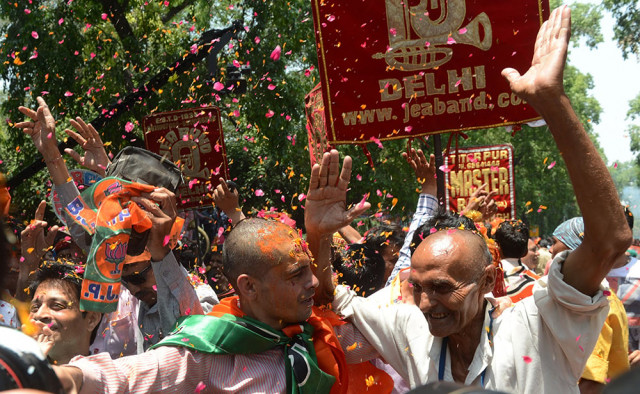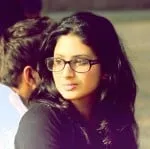To hold an election process for an estimated 814 million voters over the span of five weeks is not only a daunting process but one that is easily subjected to chaos and anarchy. However, having followed the election process diligently, I was convinced that the election process was as peaceful as it could get, even with the BJP rally fiasco in Varanasi.
 BJP's PM candidate Narendra Modi (C) waves to supporters as he arrives to file his election nomination papers in Varanasi. Photo: AFP
BJP's PM candidate Narendra Modi (C) waves to supporters as he arrives to file his election nomination papers in Varanasi. Photo: AFPHowever, the biggest hallmark of this election process is that, so far, it has been declared as free and fair as it gets. For someone who belongs to a South Asian democracy, the importance of the terminology ‘free and fair’ cannot be undermined. To consider that there are credible institutions in India that can charter such a process despite rampant issues of corruption is something that needs to be greatly appreciated. While Pakistan is still struggling to hold singular free and fair elections which are unanimously agreed upon by all parties and factions involved, India has moved long past this dilemma.
 Everyone was out to vote In Bangalore to participate in Lok Sabha Elections. Photo: AFP
Everyone was out to vote In Bangalore to participate in Lok Sabha Elections. Photo: AFPThe current electorate process expanded over nine phases with an impressive voter turnout of 66 per cent. Not only was this turnout the greatest to be witnessed in history, each voting stage was meticulously planned through. With a total of 11 million government workers and over a million troops deployed during the balloting process, this program has been rightly dubbed as one of the largest human management projects in the world. What interested me the most was that there were 1.7 million electronic voting systems which were distributed nationwide to facilitate an unbiased electorate process.
 the Lok Sabha election for the Nagaland parliamentary seat was web-casted to keep a tab on the voting process in 84 polling centres. Photo: AFP
the Lok Sabha election for the Nagaland parliamentary seat was web-casted to keep a tab on the voting process in 84 polling centres. Photo: AFPThe timing of this free and fair mantra could not have been more ironically juxtaposed with Imran Khan’s recent nine point ‘charter of demands.’ One of the most important demands put forward was to establish a bio-metric voting system for the next general elections. The importance of such a system is crucial for the Pakistani election conundrum which is always blamed for sabotage and rigging. India’s success at creating and using their bio-metric voting system has proved to be an effective tool for large democracies. If a population 10 times greater than our own could easily facilitate such a process, then for Pakistan this is no tough ordeal. Without such a system, rigging would be an inevitable and repetitive consequence that we will have to bear.
 PTI held a protest at Teen Talwar, Karachi, against alleged rigging in elections. Photo: File
PTI held a protest at Teen Talwar, Karachi, against alleged rigging in elections. Photo: FileIt is extremely unfortunate and disappointing that rather than appreciating and learning from this election process, half of Pakistan is busy condemning the victory of BJP, which Pakistan believes to be quite an extremist faction.
I, however, am more concerned about Pakistan’s future electoral process relative to its upcoming Indo-Pak relations. This incident has once again reminded me of the awkward moment of when I first crossed the Wagah border on foot and as soon as I crossed Pakistani domain, a big sign stood there mocking us as I walked past it saying ‘Welcome to India - World’s Largest Democracy’.



COMMENTS (58)
Comments are moderated and generally will be posted if they are on-topic and not abusive.
For more information, please see our Comments FAQ